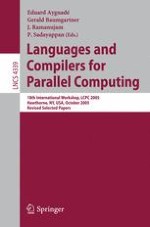2006 | OriginalPaper | Buchkapitel
Analytic Models and Empirical Search: A Hybrid Approach to Code Optimization
verfasst von : Arkady Epshteyn, María Jesús Garzaran, Gerald DeJong, David Padua, Gang Ren, Xiaoming Li, Kamen Yotov, Keshav Pingali
Erschienen in: Languages and Compilers for Parallel Computing
Verlag: Springer Berlin Heidelberg
Aktivieren Sie unsere intelligente Suche, um passende Fachinhalte oder Patente zu finden.
Wählen Sie Textabschnitte aus um mit Künstlicher Intelligenz passenden Patente zu finden. powered by
Markieren Sie Textabschnitte, um KI-gestützt weitere passende Inhalte zu finden. powered by
Compilers employ system models, sometimes implicitly, to make code optimization decisions. These models are analytic; they reflect their implementor’s understanding and beliefs of the system. While their decisions can be made almost instantaneously, unless the model is perfect their decisions may be flawed. To avoid exercising unique characteristics of a particular machine, such models are necessarily general and conservative. An alternative is to construct an empirical model. Building an empirical model involves extensive search of a parameter space to determine optimal settings. But this search is performed on the actual machine on which the compiler is to be deployed so that, once constructed, its decisions automatically reflect any eccentricities of the target system. Unfortunately, constructing accurate empirical models is expensive and, therefore, their applicability is limited to library generators such as ATLAS and FFTW. Here the high up-front installation cost can amortized over many future uses. In this paper we examine a hybrid approach. Active learning in an Explanation-Based paradigm allows the hybrid system to greatly increase the search range while drastically reducing the search time. Individual search points are analyzed for their information content using an known-imprecise qualitative analytic model. Next-search-points are chosen which have the highest expected information content with respect to refinement of the empirical model being constructed. To evaluate our approach we compare it with a leading analytic model and a leading empirical model. Our results show that the performance of the libraries generated using the hybrid approach is comparable to the performance of libraries generated via extensive search techniques and much better than that of the libraries generated by optimization based solely on an analytic model.
